Natural disasters and weather-related damage account for an annual bill of $23.46 billion in the United States. Most homeowners are counseled to practice safety at home by protecting investments, watching over loved ones, opting for healthy choices, and making responsible decisions. To some degree, those are all things you have a certain level of control over. But, what do you do when Mother Nature decides to throw you a curveball? Is there a manual of home safety tips for natural disasters to prepare you for the unexpected?
Regardless of the time of year or geographic location, Americans often find themselves falling victim to damage caused by severe weather. From wind damage and flooding to tornadoes and hurricanes, you need to know how to keep your home safe during a natural disaster. Across our country, homeowners can be the victim of:
- Hailstorms
- Tornadoes or wind and storm damage
- Hurricanes
- Flooding
- Wildfire
While you can't transplant your home to move it out of the path of danger, you can take some steps to protect your family and prevent damage to your home. Keep reading to discover our safety tips for natural disasters.
How to stay safe during a natural disaster
To keep you and your family safe during a natural disaster, these preparedness safety tips can prevent injuries and make the difference in an emergency:
- Stay informed. Tune in to local authorities for information about evacuations and safety tips.
- Have a plan for evacuation. Know where you will go during a natural disaster and how you will get there.
- Keep emergency kits on hand. Stock kits with flashlights, batteries, first aid supplies, and important identification information.
- Avoid unnecessary risks. Do not leave your home unless instructed to do so.
- Go to the safest area in your home. During a flood, go to a higher floor. If a tornado is in the area, go to a basement or inner room on the bottom floor of your home.
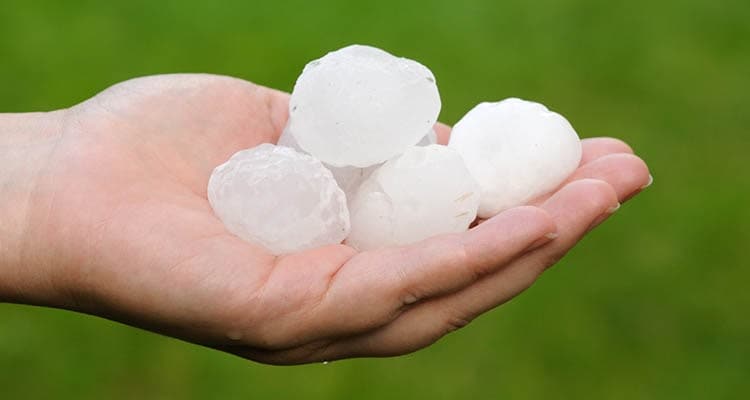

Home safety tips for hail storms
When you think of natural disasters, hail storms are not likely to jump to the front of your mind. But, these pesky storms can cause an overwhelming amount of damage to your property. In 2015, there were 5,412 major hail storms, accounting for approximately 40 percent of all insured losses.
Hailstorms can cause a significant amount of damage. But, you can prepare yourself for safety at home. First and foremost, resist the urge to bring in your possessions after hail begins to fall to avoid injuries. Your safety is of the utmost importance. You can avoid personal injury by staying indoors.
To avoid having to brave the storm, take these preventative measures:
- Park cars in garage or covered areas: Vehicles stand a better chance if they are protected in an enclosed area.
- Don’t leave furniture and other valuables outside: Store outdoor furniture in a shed or bring inside. Try to avoid leaving any other valuables outdoors, such as grills, outdoor toys, or recreational equipment like bicycles or skateboards.
- Keep clear of windows and draw curtains to protect from shattered glass: Drawing curtains will help protect from injuries caused by shattering glass.
- Assess damage immediately after storm has passed and file claim as soon as possible to avoid further damage:
- Check roof for damage. Look for torn shingles or leaks.
- Evaluate metal gutters. Make sure there are no obstructing dents or holes.
- Determine whether damage has occurred to windows or glass doors. Repair immediately.
Quick Tip: Repair the damage to your home as soon as possible after a storm has occurred. Often, you can avoid additional damage simply by making quick repairs. For example, you might avoid thousands of dollars in water damage by fixing a damaged roof.
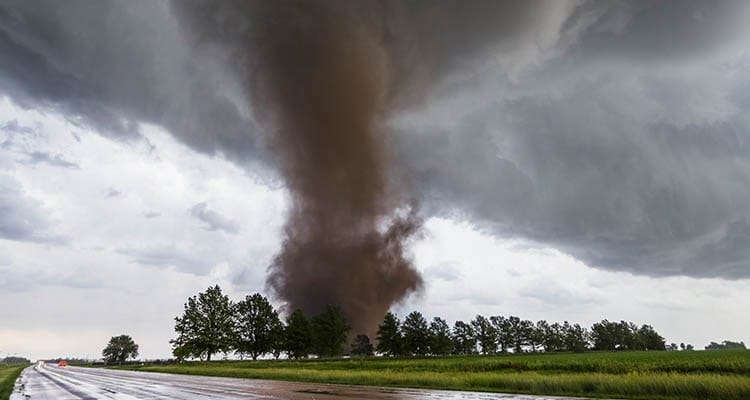

Home safety tips during a tornado or high winds
According to FEMA, the United States experiences about 1,200 tornadoes each year. On average, tornadoes claim 227 lives and lead to annual damage costs of approximately $1,086,575,000.
Tornadoes can be a scary emergency. In 2012, a category six tornado swept through parts of Indiana and Kentucky causing $1.5 billion in damage. Winds were so severe that debris was later found nearly 57 miles away.
While tornadoes often occur with little notice, there are some preventative measures you can take to prepare your home. Check out these disaster prevention tips:
- Secure large appliances with cabling or metal strapping.
- Reinforce your garage door by adding weight or replace if not in good repair.
- Secure siding. This can be done with fasteners or other materials. Check out FEMA's recommendations for more information.
- Arrange home so that heavy objects are close to floor.
- Store hazardous chemicals in secured area away from food and water supplies.
- Use covers to protect windows and doors.
- Repair any roofing that may be loose or damaged.
- Maintain EIFS (Exterior Insulation Finishing System) walls.
- Remove or trim trees of other landscaping that could cause damage in high winds.
Quick tip: Don't forget about your pets. Have an evacuation plan in place that includes safe haven for your family and your pets.
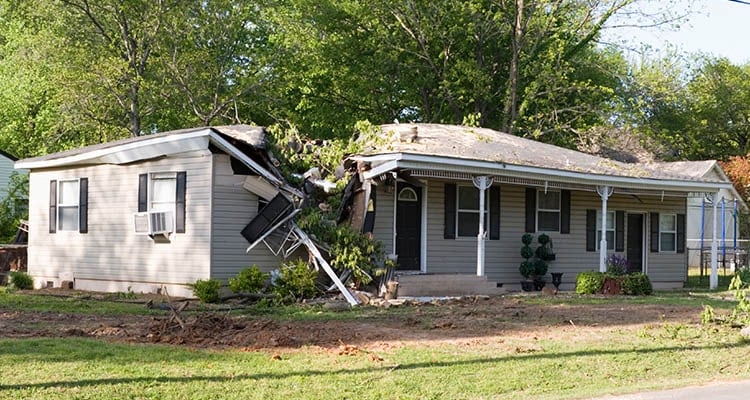

Safety at home during hurricanes
In the United States, hurricanes have cost a whopping $319.7 billion since 1992. Hurricane Katrina alone takes the spot for most expensive, with a final total of $108 billion in damage. Hurricanes are dangerous events that leave destruction scattered in its wake. Even if you aren’t located on a coast, you could still be affected by a hurricane. Preparedness safety is important regardless of where you live. According to DoSomething.org, approximately 80 percent of New Orleans was underwater after Hurricane Katrina struck.
How can you practice safety at home during a hurricane? Follow these tips.
- Remove or trim tree branches or tall bushes.
- Reinforce your garage door with additional weights and supports to prevent wind damage.
- Secure and reinforce windows and doors.
- Check and repair any loose roofing, gutters, or spouts.
- Inventory valuables.
- Prepare a disaster supply kit, including first aid items, blankets, a generator, and extra food and water.
Quick tip: If your home is damaged by a hurricane, document the damage and any injuries with photography to help in the claims process. Often, a large amount of homes are damaged in a hurricane and it can take longer to process claims. Photographic evidence is helpful during this process.
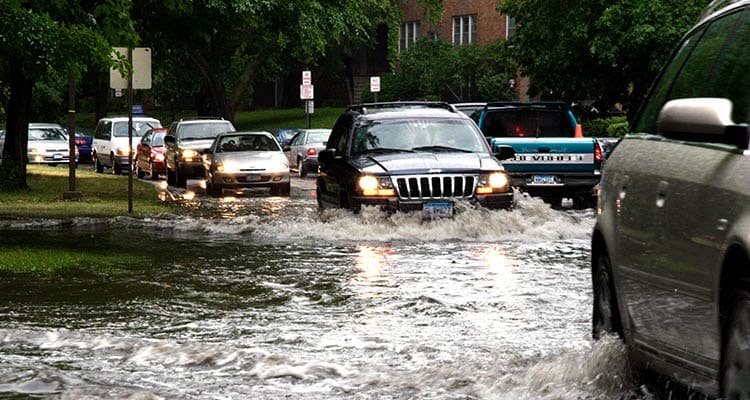

How to stay safe during a flood
Flooding occurs in all 50 states. Regardless of climate, you could be subject to emergency flooding. This natural hazard can happen anywhere and there is no rhyme or reason to predicting where a flood could strike.
- In 2016, Louisiana was affected by flooding, causing damage to more than 55,000 homes and resulting in more than $8 billion in damages.
- In 2015, a record flood swept through the Carolinas causing $1.2 billion in damages and claiming 17 lives.
- In 2014, major floods befell New York, Arizona, and Michigan.
- In 2013, a record-setting emergency flood occurred in Colorado, resulting in at least 10 deaths, affecting at least 10,000 people, and causing more than $2 billion in damage.
If these statistics tell you anything, it's that flooding is unpredictable and can affect anyone. According to DoSomething.org, "90% of all U.S. natural disasters declared by the President involve some sort of flooding." How can you protect yourself? Follow these home safety tips to keep your family and home safe during a flood:
- Store valuables in a watertight safe.
- Back up important documents online or in a safe, waterproof place.
- Prepare an evacuation plan.
- Stock emergency and first-aid supplies
- Keep extra batteries and flashlights on hand.
- If you are stuck in a building, move to the highest floor.
Quick tip: Consider flood insurance. According to FEMA, "More than 25 percent of the National Flood Insurance Program's (NFIP) flood insurance claims are for structures outside identified floodplains." Flood insurance can be purchased for as little as $80 per year.
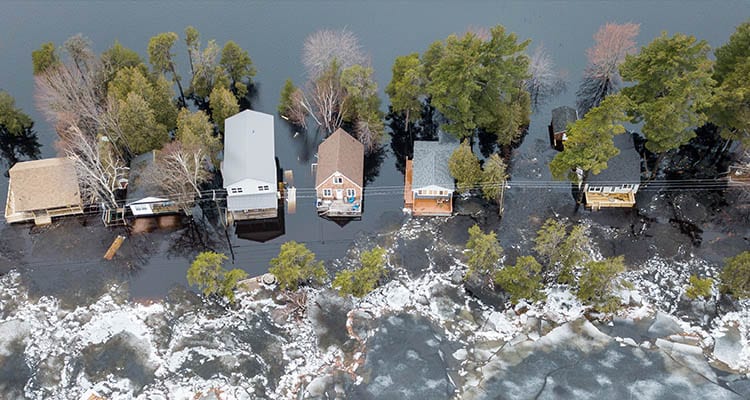

Home safety tips for wildfires
2015 set a new record in the United States for wildfires. From January to December, there were 68,151 wildfires causing damage to 10,125,149 acres. According to CNN, these fires destroyed 4,636 structures and 2,638 residences. In 2017 alone, from January 1 to March 17, 10,829 wildfires have burned 2.1 million acres. Wildfires are a serious threat and can cause an astonishing amount of damage very quickly.
Often, wildfires are caused by people. Many wildfires start because of a campfire, exhaust sparks, or even arson. Some are the result of lightning. Regardless of the catalyst, there is potential for devastation. How can you practice good safety at home to reduce the probability that your home and family will be affected?
Check out these disaster risk reduction tips:
- Install fire detectors.
- Use fire-resistant building materials when possible.
- Practice fire prevention around your home.
- Don't keep fuel sources on your property.
- Keep trees trimmed and remove dead foliage.
- Avoid using tools that create sparks in dry or windy areas.
- Do not use grills within 15 feet of your home.
- Install fire sprinklers.
- Cover all crawl spaces and access holes with 1/4 inch or less wire mesh. This prevents any blowing embers from entering your home.
- Keep a fire extinguisher in an easily accessible place.
Quick tip: Check your fire detectors frequently to ensure they are functioning properly at all times. Keep gloves and thick-soled shoes on hand to avoid injury should a fire occur.
How to keep safe during a natural disaster: Evacuation tips from FEMA
Ultimately, your safety is paramount. When a situation is beyond your control, you may need to evacuate. In any natural disaster situation, FEMA recommends practicing the "Five Ps of Evacuation":
- People: First, move people and pets or other animals to safety.
- Prescriptions: Make sure you take any necessary prescriptions, including hearing aids, eyeglasses, or asthma medication.
- Papers: Grab any important documents, including identification information.
- Personal Needs: Take items you might need such as food, water, clothing, or emergency supplies.
- Priceless Items: Bring valuables, photos, mementos, heirlooms, or anything that is irreplaceable.
Mother Nature is an unpredictable force. While you can't always avoid the potential for danger due to natural disasters, you can take preventative measures to avoid injuries, achieve safety at home, and reduce the amount of damage to your property and your family.
Contact us to find out how we can add fire and/or flood detection to your home security system.
Related Articles: